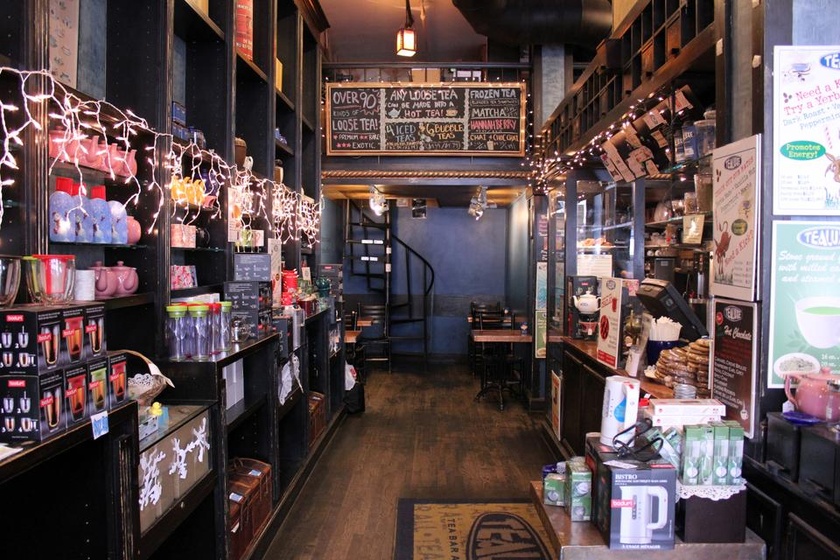The first time we meet, Joshua S. Goodman ’00, assistant professor of public policy at the Harvard Kennedy School, is drinking Earl Grey tea with a bit of milk. Earl Grey is his favorite because it makes him feel slightly British, something he has always dreamt of being. The tea is good, though not great, he says as we walk down Brattle Street. If I wanted something more exotic, he recommends that I venture to Tealuxe to try a Chinese black tea called Lapsang Souchong, which smells like an open fire. He pauses, looks up at Tealuxe’s storefront. “I actually proposed to my wife there.”
The following is the story, as told to me, of how Joshua fell in love with, and ultimately proposed to, his wife Anna E. Lumelsky ’00 over a series of dates at the café.
It was a Wednesday evening sometime in November of 2003, and the weather was slightly too chilly for wandering. Joshua was 25. He settled down into one of Tealuxe’s worn black wooden chairs, hid a ring behind the sugar packets on the tabletop, and waited for Anna. She arrived a little after five, frazzled after preparing for the bar exam; they chatted for a few moments about their days and her studying. Joshua was probably drinking Earl Grey then, too, but she definitely was not because she thinks the stuff tastes like cockroaches.
As they talked, Joshua took out a poem he wrote for her titled “3 Verses, 31 Lines, and 98 of the Letter A” and began reading. It was a silly thing, sing-songy in tone, full of references to her Russian heritage and love for Cary Grant films. At the poem’s close, Joshua gave a little speech but didn’t get down on one knee because Anna was not a fan of big displays, didn’t like spectacles. She paused after he asked her the question, paused for a very long time before saying “um…okay.” Joshua was underwhelmed by her lack of enthusiasm and asked for a do-over. She said yes that time.
Anna claims to have met Joshua at Eliot Fête freshman year, a meeting which Joshua forgets. He figures she’s right though—the pieces of her story fit together well enough. His memory places their first encounter nearly a year later, when Anna interviewed him to co-chair Harvard Hillel’s forum committee with her. As they chatted that day about the forum, Joshua noted how easy it was to talk to her. Even then, he thought it likely that he would wind up marrying the girl.
They spent the spring of 1998 planning events together for the forum and began dating late in the semester—March 31, actually (hence, the title of his proposal poem, 3/31/98). At the time, Starbucks and Tealuxe were the two cafes of choice in Harvard Square, and neither of them liked Starbucks. There was no Peet’s and no Crema, so they found themselves at Tealuxe quite often.
The specifics of most of their conversations at Tealuxe have faded, replaced by general recollections and feelings. But a few stand out. Joshua remembers how he and Anna once got into one of their recurring philosophical arguments about people’s perceptions of themselves. Anna, a highly scientific, nonreligious mind, was adamant that people believe themselves to be more important than they actually are. Joshua disagreed, claiming that individuals don’t think nearly highly enough of themselves, and that they would act very differently if they really thought themselves to be important. They never reached an agreement.
After graduation, Joshua and Anna traveled to England and back, worked for the state department in Moscow, talked about moving in together, returned to Cambridge, moved in together, started teaching high school, enrolled in Law School, watched friends move away, developed favorite television shows like “The West Wing” and “Law and Order,” made new friends—and they got married.
Joshua still revisits Tealuxe from time to time, though not too often. Life is busy with his teaching, her law practice, their two-year-old son. He did mention to the barista once that his wife agreed to marry him over there, at one of the cramped two-person copper-topped tables. She smiled and gave him a free scone.


